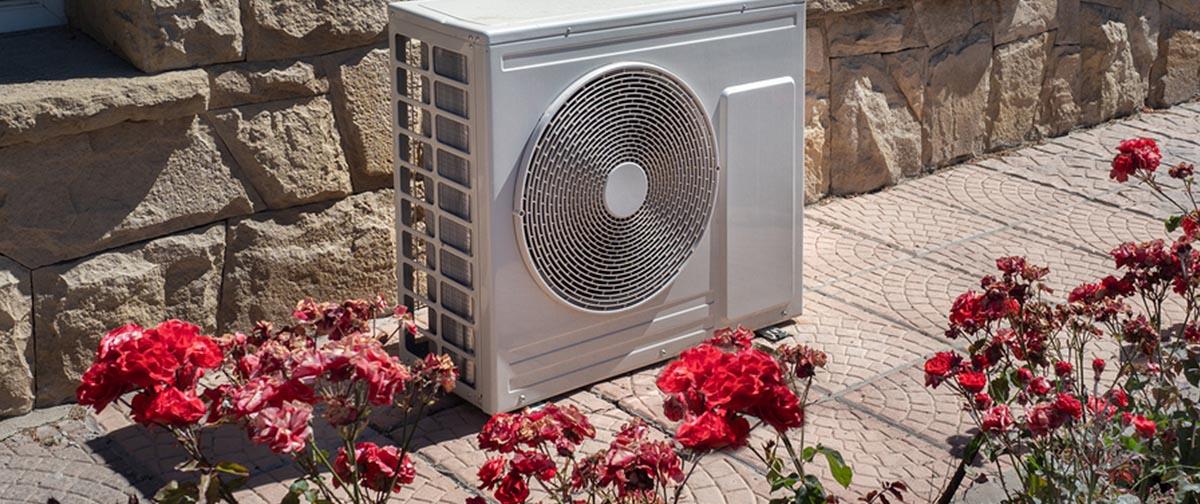Best Heating System for a New Build House

The best heating system for a new build house will look very different from 2025. This is because heating systems which burn fossil fuels – gas, oil and LPG – will no longer be installed in them. Alternatives include renewable heating systems which are all highly efficient and will give the property a lower carbon footprint.
Gas, oil, or LPG boiler
If installed before 2025, condensing gas, oil, or LPG boilers can be installed in a new build house.
While these fuels all emit carbon into the atmosphere when burned – a leading cause of climate change – these modern condensing heating systems are effective and highly efficient. Especially when compared to boilers from years gone by.
Most homes in the UK are heated by a gas boiler. To have a gas boiler installed, it's essential for the property to be connected to the gas network. When the heating is turned on, a supplier delivers gas to the property via the gas network before it's burned by the boiler.
Gas boilers have been heating homes for decades and there are some very good reasons for that.
- Cost-effective (gas is an inexpensive way to heat a home)
- Able to meet high demands for heating
- Deliver high temperatures
- Modern gas boilers are compact
Gas boilers may have proven themselves to be effective heating systems. There's no getting away from the fact that they emit carbon into the atmosphere though. Fortunately, there’s a potential solution that would allow us to continue heating our homes with a slightly tweaked gas boiler. And that's hydrogen.
Hydrogen is a low-carbon alternative to natural gas that can be delivered to properties via the very same gas network.
When it comes to properties that aren't connected to the gas grid, oil and LPG are often the heating systems of choice. Both of these fuels can be purchased in bulk and stored locally at the property. Plus, they typically only cost slightly more per kilowatt-hour than natural gas.

No matter which fuel is used to heat your home, there's a choice to be made in terms of boiler type. With combi and system boilers being the most popular options.
Combi boilers are single cost-effective heating systems. Everything they need to provide heating and hot water is within the boiler itself. This makes them extremely compact and removes the need for any additional tanks or cylinders.
Most combi boilers are ideal for installation in homes with a single bathroom – and potentially an ensuite too. This is because they heat and deliver hot water on demand, rather than storing it in a cylinder.
For larger properties with multiple bathrooms a system boiler is a better option to a combi. This is because they store domestic hot water in a cylinder allowing them to deliver hot water to multiple outlets at a time. On the downside, once the cylinder is empty, you will have to wait for it to fill up again.
Under current government policy, from 2025, gas, oil and LPG boilers will be banned from installation within new build homes. This announcement came as part of government efforts to lower carbon emissions. For that reason, you may want to consider a renewable heating system.
Best renewable heating systems for a new build
A renewable heating system does the very same job as a conventional boiler – providing a property with heating and hot water. Rather than burning fossil fuels and releasing carbon into the atmosphere, they generate heat from renewable energy sources. These renewable energy sources include the air, ground, wood and sun.
Some of the best renewable heating systems for new build homes include:
- Air source heat pump
- Ground source heat pump
- Biomass boiler
- Solar thermal panels
To get the most out of a renewable heating system, your property must be well insulated. This is because renewable heating systems, heat pumps in particular, can't provide heating to the same high temperatures as gas, oil and LPG boilers. So preventing as much of that heat as possible from escaping will increase efficiency and make your home more comfortable.
Strongly considering an alternative to a gas boiler? Find out your options.
Air source heat pump

Air source heat pumps are the most popular renewable heating system in the UK. Largely because they don't take up so much space and are relatively straightforward to have installed.
An air source heat pump heats the home by extracting heat from the air outside. They can do this all year-round, even in below freezing temperatures. They will run more efficiently during the warmer months though.
There are two types of air source heat pump: air-to-water and air-to air.
Air-to-water heat pumps are suitable for properties with a wet central heating system. This could be radiators or underfloor heating. Air-to-air heat pumps, on the other hand, heat the property via a network of fans and can provide cooling during the summer too.
Take a look at pros and cons of installing an air source heat pump.
Ground source heat pump

Ground source heat pumps absorb heat from the ground to provide central heating and domestic hot water. To do this, a network of pipes is installed underground (either vertically or horizontally) where temperatures sit at a consistent 10-15°C all year round.
As the pipes need to be buried underground, the installation can take several days. It can also be a fairly disruptive process as digging machinery will need access to the garden area.
While ground source heat pumps are more complicated to install than air source heat pumps they can provide higher year-round efficiencies.
See if a ground source heat pump is the right option for your home.
Get FREE Heat Pump Quotes
Biomass boiler

Biomass boilers burn fuel in the same way as gas and oil boilers. However, the he key difference being that the fuel they use is plant-based. Depending on the model, a biomass boiler will burn either wood logs, pellets or chips. This is far more sustainable than burning fossil fuels and it's carbon neutral too.
If you live near a woodland area then you could potentially heat your home for free by collecting sustainable wood logs.
There are two types of biomass boiler: one that you have to load with fuel yourself (manual) and those that take care of this automatically via a hopper. Automatic biomass boilers tend to be the most expensive option but they do save you a job.
Find out more about biomass boilers.
Solar thermal panels

Solar thermal panels are installed onto the roof where they absorb heat from the sun. This heat can then be used to warm the water within a cylinder for free.
They're not a complete heating system though so this means they'll need to be installed alongside a boiler or heat pump. Even as only part of the heating system, solar thermal panels can reduce your carbon emissions and heating bills by a considerable amount.
Get to know more about solar thermal heating systems.
Electric heating with solar PV
An electric heating system, such as an electric boiler or infrared panels, is another option for new build homes. The only downside being that electricity is a relatively expensive way of heating a property.
Electricity doesn't have to be expensive. By pairing an electric heating system with solar PV, you can heat your home for free by generating your own renewable electricity. This will also guarantee that the electricity wasn't produced using fossil fuels.
Some of your options when it comes to electric heating is an electric boiler or infrared panels.
Electric boilers work much like gas and oil boilers. The key difference being that they don't burn fuel. Instead, the electricity is used to produce heating and hot water. This means they have fewer moving parts which greatly reduces the risk of a fault.
The downside to electric boilers is that they can't meet high demands for heating making them best suited to small homes and flats.
Alternatively, you could turn to infrared panels. Infrared panels work independently of one another which means they aren't connected to a heating system such as a boiler. Rather than heating the space in a room, as conventional radiators do, infrared panels directly heat people and objects.
Infrared heating panels respond to demand for heating much faster than other heating systems so you'll feel warmer sooner. Plus, the walls and other objects will retain heat making you feel warmer for longer.
Cost to install a heating system in a new build
In terms of upfront costs, the most affordable heating systems for new build homes are boilers that run on gas or electricity. Oil and LPG boilers aren't too far behind but additional costs need to be considered for the installation of a tank to store the fuel.
| Heating System | Potential Cost Including Installation |
|---|---|
| Gas combi boiler | £1,000 – £2,500 |
| Gas system boiler | £1,000 – £3,000 |
| Oil combi boiler | £1,500 – £4,500 |
| Oil system boiler | £1,500 – £5,000 |
| Electric boiler | £1,000 – £2,500 |
| Air source heat pump | £4,000 – £12,000 |
| Ground source heat pump | £8,000 – £18,000 |
| Biomass boiler (manual) | £4,000 – £12,000 |
| Biomass boiler (automatic) | £9,000 – £21,000 |
| Solar thermal panel | £4,000 – £5,000 |
Renewable heating systems typically cost more to install but they're very well suited to new-builds. Particularly if the property is still being built. This is because new-builds have to meet certain efficiency standards which include high levels of insulation. Plus, if the property is still being built, a suitable heat distribution system can be installed (large radiators or underfloor heating).
Choose to install a renewable heating system then you’re likely to see your heating bills drop. They also don't need to be replaced for 20-25 years, that's around twice as long as a boiler. However, in the case of heat pumps, your electricity bills will rise but you will have the added bonus of being able to apply for the Renewable Heat Incentive.
Earning through the Renewable Heat Incentive
To encourage more homeowners to turn to renewable heating systems, the government launched the Renewable Heat Incentive (RHI). Through the RHI scheme, you can receive payments for the heat produced by your renewable heating system.
Heating system eligible for the Domestic RHI include:
- Air source heat pumps
- Ground source heat pumps
- Biomass boilers
- Solar thermal panels
RHI payments are made quarterly over a 7 year period. The amount you'll receive is based on your heating system and how much heat it generates. Tariffs are set by Ofgem and evaluated on a quarterly basis.
| Renewable Heating System | Tariff (pence per kilowatt-hour) |
|---|---|
| Air source heat pump | 10.85 |
| Ground source heat pump | 21.16 |
| Biomass boiler | 6.97 |
| Solar thermal panels | 21.36 |
Which is the best heating system for a new build?

At the moment, homes connected to the gas grid are best off with an efficient gas boiler. They're efficient, cost-effective and capable of keeping your home at a comfortable temperature.
Alternatively, if you're particularly conscious of your carbon footprint, then a hybrid heating system could be the answer. Hybrid heating systems are made up of a gas boiler and heat pump or solar thermal. The system will automatically switch between the two heating systems depending on which is the most efficient at that point in time.
Given that new build homes have to be built to certain energy efficient standards (meaning they should be well insulated) then a renewable heating system is a good option. This could be a heat pump, biomass boiler, solar thermal or electric heating system powered by solar PV.
Off grid homes should consider biomass or a heat pump, possibly with solar thermal for maximum savings.
Get free quotes for a new heating system
The installation of any heating system should only go ahead once you've compared quotes from at least three qualified installers. By comparing quotes, you're putting yourself in the best position to get the most competitive price from the right person for the job.
At Boiler Guide, we've made finding quotes easier than ever. Simply complete our online form and you'll get free quotes from up to three installers in your area.
There's no-obligation to accept any of these quotes and we aim to have them with you as quickly as possible.
Get FREE Quotes for a Renewable Heating System



